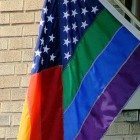July 25, 2011; Source: The Washington Post | Last week, 60 or so families attended a four-day summer camp in Virginia’s Shenandoah Mountains. Kids and their parents got to play new games, try exotic food, and dress up in different clothes. They were at the Ethiopian Heritage and Culture Camp (EHCC) which is designed to help Ethiopian children and their adoptive families learn about the Eastern African nation’s heritage and culture.
The camp was founded three years ago by Mekdes Bekele, a native of Ethiopia who discovered that some of the challenges she faced raising a bicultural child were shared by white adoptive parents. Bekele’s yearly gathering is a safe space where Ethiopian American kids and their white families can take classes in Amharic and Ethiopian etiquette, music and cooking.
Mike Boucher, who came all the way from Albany, N.Y. with his seven-year-old African child said, “We thought it was important for us to learn about our daughter’s culture and help her maintain that identity.”
Sign up for our free newsletters
Subscribe to NPQ's newsletters to have our top stories delivered directly to your inbox.
By signing up, you agree to our privacy policy and terms of use, and to receive messages from NPQ and our partners.
Suri Phillips, a nine-year-old who came to the United States the same year EHCC opened, was delighted by what she found. “I don’t see brown people very often where I live. And now, I see all these other kids and families that look like mine,” she shared. “I know I’m not alone. It’s not just me.”
The sense of difference and isolation adopted children from overseas feel can be alleviated by programs such as the heritage camp. Last year, more than 2,500 children from Ethiopia joined thousands of others who now live in America. From 1999 to 2010, the U.S. Department of State reports that close to 225,000 children from all over the world were embraced by American families. – Erwin de Leon













